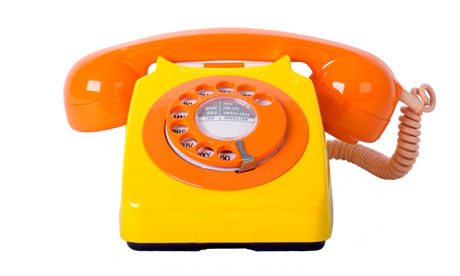'Are you on the phone?'
I can still remember my parents asking people this in the 1970s. Within my lifetime it was still, just about, conceivable that someone would have a home with no telephone land-line. How odd it seems now to have to phone a building where someone might be, in the hope that they might be lurking somewhere nearby. (And have you heard anyone in the last twenty years answer their phone with the name of their exchange and their number? 'Pilchester 5064?' It's something which I think only the over-70s would do now.)
In the 1990s, of course, this question simply became replaced by the updated version, 'Do you have a mobile number?' - now pretty much as superfluous - and then 'Are you on the Internet?' It doesn't seem that long ago that we heard BBC presenters hesitantly speaking of 'the Information Superhighway', and offering 'our electronic mail address' in a tone of voice clearly designed to indicate that they thought it would be a passing craze, like LaserDisc or CB Radio.
Just as an amusing diversion, here's what the Internet looked like in 1996. And also what the high-velocity real-time-action Kiefer Sutherland TV show 24 would have looked like if shot in the age of dial-up, pagers and dot-matrix printers. Well, I found it funny.
All of that doesn't really seem all that long ago, does it? I still have to pinch myself and remember that, actually it isn't ten years since Ace of Base and 2 Unlimited and the brilliant Century Falls on Children's BBC - it's twenty. How did that happen?! Some adults with proper jobs were born in 1990. The latest Eurovision winner Emmelie de Forest, actress Taylor Momsen, singer Cher Lloyd and diver Tom Daley were all born in 1993-94! They should surely all still be at primary school. So if you wrote a book in the 1990s, thinking it was bang up to date at the time, it's quite salutary to be pulled up short and reminded that it's now pretty old-fashioned. A thriller with hardly any mention of mobile phones, and none of the Internet or social networking, would seem very odd indeed.
And yet writers working today still have to find ways of making their plots work without these things. The Famous Five never had mobile phones or iPods or Blackberries - their tales of skulking in old houses and catching smugglers would have been very different had they been able to keep in touch by BBM and SMS. But it's no coincidence that, most weeks in The Sarah-Jane Adventures - the Famous Five of the 2000s - the script had to find a way of having the young heroes' mobile phones lost, disabled or confiscated. Otherwise it would all have been too easy. And somewhere out there, I'm sure, a media student is writing a dissertation on the effect of the mobile phone on the plot structure of the thriller.
So much of young people's socialising and interacting is done online now. Facebook may already be becoming a little passé among teens, but they have Twitter, Kik, BBM, Snapchat... Entire weekends are arranged through these media, and they are the places where friendships can be forged and hearts can be broken. A teenage girl can fall out with someone not because of a 'look' in the corridor, but because they failed to 'Like' her Instagram post. (To be fair, grown adults do this too.) A recent Facebook meme about the changing face of London, lamenting the departure of the Virgin Megastore, harked back to the days when this landmark would be a meeting-point for teens spending the days in London. These days, of course, there's barely a need for a 'meeting point' at all. ('If you get lost, meet me by the entrance' is a mantra of my mother's I can still recall from shopping expeditions to what seemed like a vast, cavernous Marks & Spencer - after going to the bank and waiting while she stood in the queue with a cheque made out to 'Cash', in those pre-cashpoint days.)
So this presents problems for the writer of young people's fiction. How do we represent interaction via social media, in a way that is still dramatically interesting and exciting? Does the world of BBM and Snapchat represent whole new opportunities for being creative? Perhaps it does. We just need to discover what they are. Or do we just start a whole new craze for retro novels set in the 1970s, with children whose parents tell them to meet at the door of M&S if they get lost, and queue at the bank in the lunch-hour - and ask each other, 'Are you on the phone?'


No comments:
Post a Comment